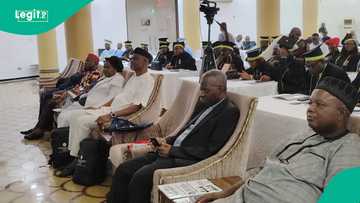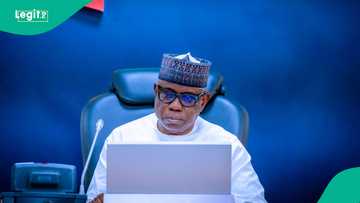Legit.ng journalist Ridwan Adeola Yusuf has over 9 years of experience covering public affairs and governance in Nigeria.
FCT, Abuja – Tajudeen Abbas, speaker of the house of representatives, on Monday, September 8, raised alarm over Nigeria’s rising debt profile.
As reported by Daily Trust, Abbas warned that it has crossed the country’s statutory threshold and now threatens fiscal sustainability.
Photo credit: @Speaker_Abbas
Source: Twitter
Concerns as Nigeria’s debt balloons
Speaking at the opening of the 11th Annual Conference and General Assembly of the West Africa Association of Public Accounts Committees (WAAPAC) at the national assembly, Abuja, Abbas said Nigeria’s debt had reached “a critical point” and called for urgent reforms in borrowing practices and oversight.
He said:
“As at the first quarter of 2025, Nigeria’s total public debt stood at N149.39 trillion, equivalent to about US$97 billion. This represents a sharp rise from N121.7 trillion the previous year, underscoring how quickly the burden has grown. Even more concerning is the debt-to-GDP ratio, which now stands at roughly 52 percent, well above the statutory ceiling of 40 percent set by our own laws.”
He described the breach of the debt limit as “a signal of strain on fiscal sustainability,” stressing the need for “stronger oversight, transparent borrowing practices, and a collective resolve to ensure that tangible economic and social returns match every naira borrowed.”
Abbas warned that across Africa, several countries are in dangerous debt-to-GDP territories, with governments spending more on servicing loans than on healthcare and essential services.
He said:
“This is not just a budgetary concern, but a structural crisis that demands urgent parliamentary attention and coordinated reform.”
To address the growing fiscal risks, Abbas announced that Nigeria is ready to champion the establishment of a West African Parliamentary Debt Oversight Framework under WAAPAC.
The framework, he explained, will harmonise debt reporting across the sub-region, set transparency standards, and empower parliaments with timely data to scrutinise borrowing practices.
He also disclosed plans for a regional capacity-building programme for Public Accounts and Finance Committees, equipping members with modern tools for debt sustainability analysis and fiscal risk assessment.

Read also
Corruption: Catholic priest says countries without EFCC, ICPC, others doing better than Nigeria
Abbas, while warning against reckless debt, said borrowing should be for the purpose of bridging critical infrastructural gaps.
He said:
“Borrowing should support infrastructure, health, education, and industries that create jobs and reduce poverty. Reckless debt that fuels consumption or corruption must be exposed and rejected. Oversight is not just about figures, but about the lives and futures behind those figures.”
Furthermore, the speaker reiterated the 10th house’s commitment to accountability, saying that under its Open Parliament policy, major borrowing proposals would be subjected to public hearings, while simplified debt reports would be made available to citizens.
Source: Legit.ng
